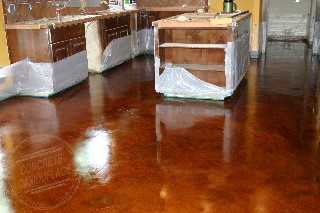Sealing Concrete with Solvent Base Concrete Sealer
Sealing with Solvents.

NOTE: Concrete Camouflage does not manufacture Solvent Base Sealers, only water based sealers. However, we know that some of our customers prefer them and so we have posted what we know about them here, to help guide you. However, you should refer to the specific manufacturer instructions for their particular products.
When using a solvent base sealer, the concrete needs to be bone dry.
Any concrete stain residue needs to be neutralized and rinsed well by mopping up or washing off and it needs to be free from dirt.
-
Never pour the sealer directly onto the concrete. Remove the pail's lid and dip paint roller, or use a paint pan.
-
Apply the sealer with a paint roller in 2 generous coats.
-
Allow to dry between coats until no longer sticky. After final coat, allow to dry and cure for at least 72 hours before waxing or allowing any foot traffic.
*Generous coats means applying plenty to cover but not so much as to puddle or cause excessive build up, but more than if it were paint.
*Do not allow your roller to run dry as you are not trying to stretch out this product. It goes on thick.
-
Minimum application temperature 45 degrees F.
-
Avoid applying in extreme heat or hot direct sunlight as bubbles may occur.
-
Clean up tools and spills with Xylene, or lacquer thinner, found at your local home improvement store. Do not use paint thinner.
Tip. The way the concrete looks after you have neutralized and rinsed it, while it is still wet with water, is what it would look like if sealed with a solvent base sealer.
Tip. Avoid sealing when rain is expected. Turn Off sprinkler systems when outside. Solvent Base sealer that has not completely cured can turn white if gotten wet.
Tip. The solvents in the sealer are flammable. If applying indoors, ensure there is no open flame including pilot lights, as the fumes may build up. Ensure you have adequate ventilation, using mechanical means if needed. If the fumes are not completely dissipated come nightfall, you may need to stay elsewhere for the night.
Tip. Not all surfaces should be sealed because they look better in their natural flat state and the gloss from the sealer wouldn't do. Examples would be statuary, retaining walls, and the exterior concrete house slab sides that are exposed. These surfaces require no maintenance.
Tip. If your project is outdoors, then you may want to use Clear Grip traction additive to help with added traction, as sealed concrete is slippery when wet, especially solvent base sealers.
Tip. If your project is indoors. You can enjoy low maintenance, and scuff resistance that lasts for months by using our inexpensive mop on wax, which is not only less slippery than sealer alone, but keeps you from having to reseal as well.
When using solvent based sealers, be sure to have plenty of ventilation and ensure there are no flame or heat sources, including pilot lights. Do not sleep indoors unless the fumes have been completely ventilated. Use open windows and fans as needed to move fresh air in and the sealer fumes out.
